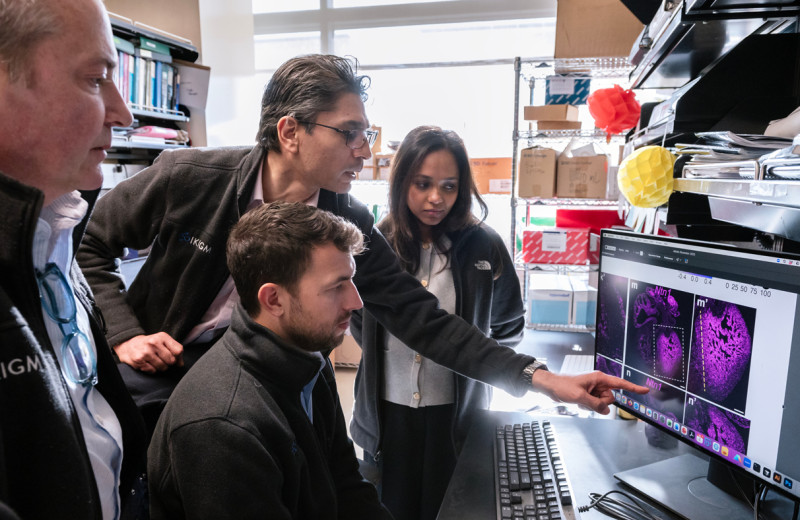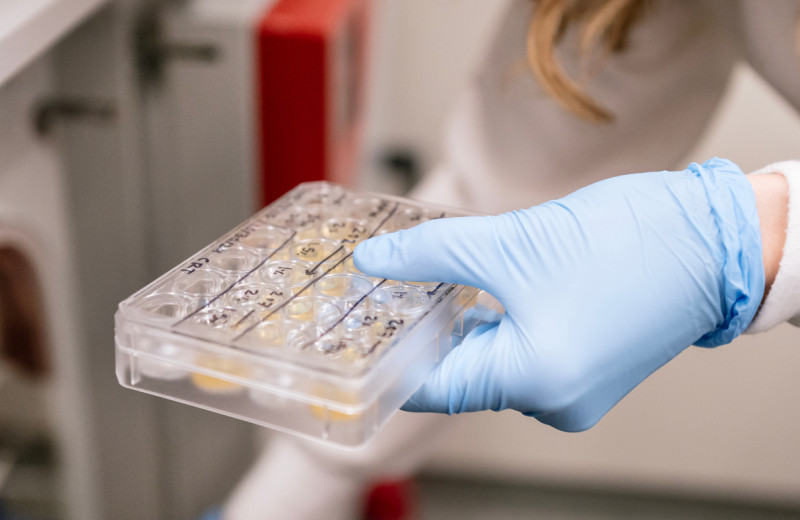Gladstone NOW: The Campaign Join Us on the Journey✕

Cure Network Dolby Acceleration Partners, LLC, a business endeavor with Dolby Family Ventures and Evotec AG, will focus on accelerating the translation of relevant scientific discoveries from the Gladstone Institute of Neurological Disease into potential therapies for Alzheimer's disease. [Photo: Chris Goodfellow]
The Gladstone Institutes announces the creation of Cure Network Ventures Inc. and Cure Network Dolby Acceleration Partners, LLC, a business endeavor with Dolby Family Ventures and Evotec AG, which will focus on Alzheimer’s disease. Working through Cure Network Ventures, Inc., the new company will help expedite the translation of relevant scientific discoveries from the Gladstone Institute of Neurological Disease into the development of potential therapies.
“This entrepreneurial translational model utilizes the particular strengths of the three partners and promotes their interactions, allowing for maximum leverage of all resources,” says Gladstone’s Vice President of Corporate Liaison and Ventures, Stephen Freedman, PhD.
Taking basic science discoveries through the development stage toward drug design is challenging. One of the primary issues is that critical steps in the process are beyond the financial resources provided by conventional academic funding models, creating a gap often referred to as “the valley of death.” Cure Network Dolby Acceleration Partners bridges this gap by combining a highly innovative scientific research program with state-of-the-art drug discovery capabilities and a funding source interested in identifying new therapeutic avenues for Alzheimer’s disease.
Lennart Mucke, MD, Director of the Gladstone Institute of Neurological Disease, says: “Several of our scientific discoveries have culminated in the identification of new therapeutic targets. We look forward to collaborating with our new partners on the prudent selection and accelerated development of the most promising among them. We are extremely grateful to Dave and Dagmar Dolby, Pascal Levensohn, and Evotec AG for helping to make this exciting venture possible.”
The first phase of the partnership will fund the development of two unique programs that aim to block key mechanisms suspected of promoting abnormal neuronal network activity and cognitive decline in Alzheimer’s disease. One will focus on the protein tau that accumulates in brain cells of patients with Alzheimer’s disease and in other neurodegenerative disorders. The other will focus on an important ion channel that may be involved in the generation of detrimental brain rhythms in Alzheimer’s disease and neuropsychiatric conditions.
David Dolby, Managing Director, Dolby Family Ventures, joined forces with Gladstone because its research has great potential to change the progression of Alzheimer’s disease. “We recognize the importance of generating more productive links between academia and industry,” says Mr. Dolby. “Gladstone conducts trailblazing and rigorous research to discover new therapies for Alzheimer’s disease. We are honored to team up with Gladstone and Evotec to work on finding a cure.”
Building bridges between academia and industry is also a fundamental theme for Evotec AG. As a highly respected partner in the drug research and discovery community, they enable the process that moves early scientific ideas into the pharmaceutical industry and, ultimately, to patients. Evotec’s focus is on first-in-class research into the causes of diseases, and not just the symptoms. Based on the highest quality drug discovery science and through this type of creative collaboration, Evotec has built a substantial partnered product pipeline.
Alzheimer’s disease affects more than 36 million people worldwide and puts an enormous burden on families, health care systems, and the global economy. There are currently 5.4 million people affected in the US, which results in costs of more than $200 billion per year. With the number of patients expected to triple by 2050, the cost is predicted to reach more than $1 trillion per year. Bold initiatives and partnerships, such as Cure Network Dolby Acceleration Partners, are necessary to devise new ways to combat this overwhelming disease.
“Different kinds of funding are needed throughout the development of new treatments,” says Gladstone president, R. Sanders Williams, MD. “While philanthropy and government resources support critical early stages of investigation, new creative solutions exemplified by this enterprise are precisely what we need to advance the most promising research findings toward therapies that will eradicate devastating diseases such as Alzheimer’s.”
For Media
Julie Langelier
Associate Director, Communications
415.734.5000
Email
About Gladstone Institutes
Gladstone Institutes is an independent, nonprofit life science research organization that uses visionary science and technology to overcome disease. Established in 1979, it is located in the epicenter of biomedical and technological innovation, in the Mission Bay neighborhood of San Francisco. Gladstone has created a research model that disrupts how science is done, funds big ideas, and attracts the brightest minds.
Disrupted Boundary Between Cell Types Linked to Common Heart Defects
Disrupted Boundary Between Cell Types Linked to Common Heart Defects
Gladstone scientists identified a cellular boundary that guides heart development and revealed how disrupting it can lead to holes in the heart’s wall.
News Release Research (Publication) Congenital Heart Disease Cardiovascular Disease Bruneau LabGene Editing Strategy Could Treat Hundreds of Inherited Diseases More Effectively
Gene Editing Strategy Could Treat Hundreds of Inherited Diseases More Effectively
Scientists at Gladstone show the new method could treat the majority of patients with Charcot-Marie-Tooth disease.
News Release Research (Publication) Neurological Disease Conklin Lab CRISPR/Gene EditingGenomic Maps Untangle the Complex Roots of Disease
Genomic Maps Untangle the Complex Roots of Disease
Findings of the new study in Nature could streamline scientific discovery and accelerate drug development.
News Release Research (Publication) Marson Lab Genomics Genomic Immunology



